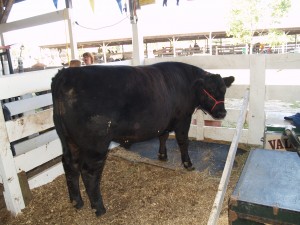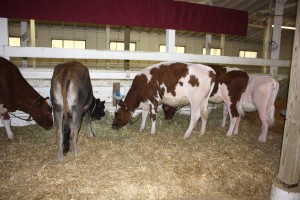Beef Comes From Male or Female Cows

If you're new to the cattle world, keeping bulls, steers, cows and heifers straight is confusing. Even though you once thought that "cow" was a blanket term used for all cattle in all situations, you'll catch on quickly to the correct terminology.
Bulls
 A bull, also known as a sire, is a mature male bovine that is at least 2 years old used for breeding purposes. Bulls are usually not used for meat.
A bull, also known as a sire, is a mature male bovine that is at least 2 years old used for breeding purposes. Bulls are usually not used for meat.
Bulls are not castrated because they have desired traits that producers want to use for breeding. Typically, a sire will produce more calves in its lifetime than a cow, according to Extension Beef Cattle Breeding Specialist John L. Evans, Ph.D., at Oklahoma State University Extension.
Bulls are usually larger than other cattle. They have large, muscular shoulders, necks and hindquarters. A hump is usually noticeable on its shoulders. When bulls are full grown, they can weigh as much as 2,000 pounds. According to OSU Extension, young bulls can reach half of their mature weights in as little as 14 or 15 months.
Don't let a bull's horns trick you; the breed of cattle determines if a bull has horns or not. Museum of Life and Science explains that many dairy breeds will have horns on both male and female cattle.
Steers
 A steer is a castrated male bovine. Male bovines are castrated when they are young and before they develop the bull's physical characteristics, according to USDA. Steers are less aggressive than bulls. Steers are normally raised for meat.
A steer is a castrated male bovine. Male bovines are castrated when they are young and before they develop the bull's physical characteristics, according to USDA. Steers are less aggressive than bulls. Steers are normally raised for meat.
A steer won't be as muscular as a bull. It's shoulders won't be as large or muscular. Another way to tell the difference between a bull and a steer is to check if the bovine has testes. If it does, it is a bull; it if doesn't, it is a steer. Sometimes, it can be difficult to distinguish between steers and heifers. Heifers have a vulva beneath their tails, while steers do not.
Cows
 A cow is a mature female bovine that has had at least one calf.
A cow is a mature female bovine that has had at least one calf.
Cows have larger hips and thicker middles. Compared to bulls, they look feminine. Cows should have a slightly angular body shape, lean-looking shoulders and a broad chest, according to University of Arkansas Division of Agriculture.
Heifers
 Heifers are young female cattle that have not yet borne calves. Heifers can be used for breeding, and they can also be raised for beef. Heifers are bred once they reach maturity (about 12 to 14 months), according to University of Nebraska-Lincoln. Once a heifer has a calf, she becomes a cow.
Heifers are young female cattle that have not yet borne calves. Heifers can be used for breeding, and they can also be raised for beef. Heifers are bred once they reach maturity (about 12 to 14 months), according to University of Nebraska-Lincoln. Once a heifer has a calf, she becomes a cow.
Heifers are similar in appearance to cows, but lack the mature characteristics of cows such as prominent hips and thick middles.
Calves
Both baby male and female cattle are referred to as calves. They're called weaners once they're weaned, and then yearlings once they're a year or two old.
Quickest way to determine gender
Don't rely on the appearance of horns on cattle to determine if an bovine is a cow or a bull. Instead, look between the animal's back legs. A side view of the animal will offer you the best view to determine the gender. Cows have udders; bulls have scrotum. Steers will not have testes like bulls. Heifers have teats but no visible udder like cows do.
Also, don't rely on the color of a cow's skin to determine if it's a bull or a cow. A bovine's breed, not its gender, determines it's color. For instance, Angus cattle are typically black, Jersey cattle are brown and Holsteins are black and white. For information about cattle breeds, refer to Oklahoma State University's Department of Animal Sciences page.
Related Content
- How to identify common breeds of dairy cattle
- How to identify common breeds of beef cattle
STAY INFORMED. SIGN UP!
Up-to-date agriculture news in your inbox!
Source: https://www.farmanddairy.com/top-stories/how-to-determine-if-cattle-are-bulls-steers-cows-or-heifers/274534.html
0 Response to "Beef Comes From Male or Female Cows"
Post a Comment